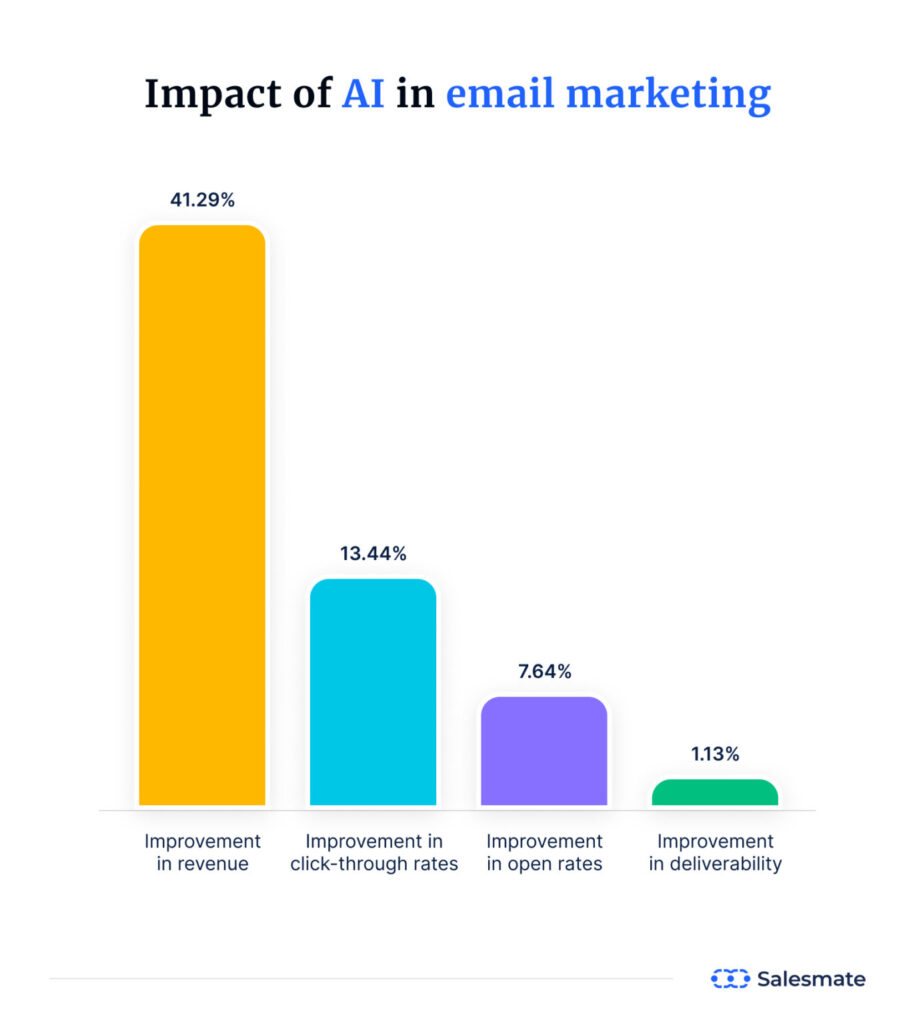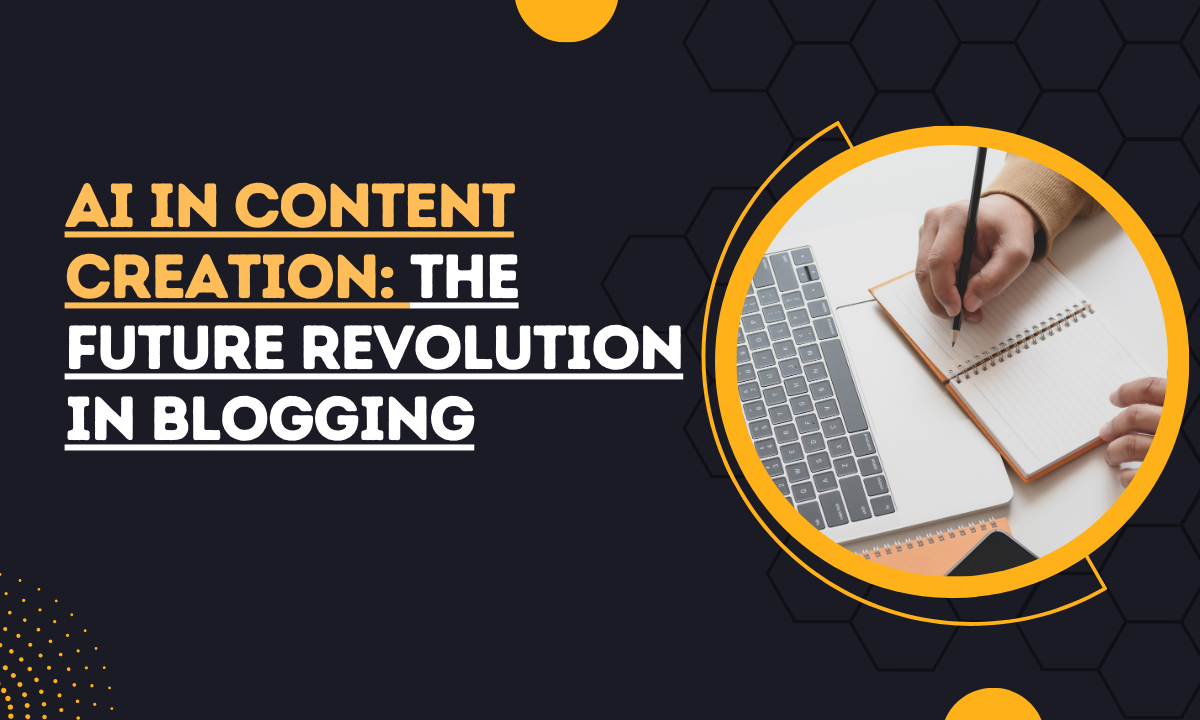AI in Content Creation: The Future Revolution in Blogging
The landscape of content creation is transforming at a rapid pace, and at the heart of this evolution lies Artificial Intelligence (AI). AI’s capabilities are enabling bloggers and content creators to produce more engaging, insightful, and effective content in less time than ever before.
With advances in natural language processing (NLP), machine learning (ML), and automation, AI is not only changing the way we create content but also how we strategize, analyze, and optimize it. Here’s an in-depth look at how AI is shaping the future of blogging and what it means for the content creation industry.
1. The Role of AI in Content Ideation and Topic Research
One of the biggest challenges for bloggers is identifying topics that resonate with their target audience. AI simplifies this process through predictive analysis and trend forecasting.
AI-Powered Topic Generation Tools
AI tools like BuzzSumo and Ahrefs help bloggers analyze popular content trends, keyword search volumes, and social media discussions.
They can suggest topics that are currently gaining traction and identify content gaps that haven’t been fully explored.
Using AI, bloggers can ensure that their topics align with what audiences are interested in, ultimately boosting engagement and SEO performance.
Audience Analysis and Insights
AI algorithms analyze user behavior data from social platforms, website analytics, and even competitor websites.
With these insights, content creators gain a deeper understanding of audience preferences. They can connect with audeince’ pain points, and interests, allowing them to craft hyper-relevant content.
The result is a better fit between content and audience needs, leading to higher engagement rates and improved SEO rankings.
2. Streamlined Content Creation with AI Writing Tools
The actual writing process has also been transformed by AI, making content creation faster and more efficient.
Natural Language Processing and Automated Content Writing
AI-powered tools like ChatGPT, Jasper, and Copy.ai have made automated content generation accessible to bloggers and marketers.
These tools leverage natural language processing (NLP) to understand context and generate human-like text based on the input provided.
Bloggers can now create initial drafts, product descriptions, social media posts, and even entire articles with just a few prompts, significantly reducing content production time.
Enhanced Creativity and Idea Expansion
AI tools don’t just generate text; they can also inspire creativity. By providing new angles, suggestions, and language variations, AI helps bloggers brainstorm unique ideas.

Famous blogger, Pat Flynn of says “One of the hardest parts of writing is staring at a blank screen, aka. ‘the blinking cursor of death.’ AI can get us from 0% to 60%, and sometimes even up to 75% of the way there”
For instance, Writesonic offers multiple tone options and styles, enabling bloggers to experiment with various approaches and expand on ideas.
This flexibility allows creators to produce more varied content and reach broader audiences.
3. Boosting SEO with AI-Powered Optimization
SEO remains a crucial element of any successful blog, and AI plays a critical role in optimizing content for search engines.
AI-Driven Keyword Research and On-Page SEO
AI-powered tools such as Surfer SEO and MarketMuse offer bloggers the ability to optimize content in real-time by analyzing the top-ranking pages for specific keywords.
These tools provide semantic keyword suggestions and insights on keyword density, readability, and structure.
AI also suggests ideal meta titles, descriptions, and heading structures to maximize SEO performance, making content more competitive in search rankings.
Content Analysis and Improvement Suggestions
AI platforms can evaluate content’s readability, coherence, and emotional impact.
Tools like Grammarly and Hemingway highlight grammatical errors, suggest style improvements, and offer tone adjustments. This ensures the content is both engaging and professional.
Bloggers can rely on these insights to create polished, high-quality content that appeals to both readers and search engines.
4. Enhancing Reader Engagement through AI Personalization
In today’s competitive content landscape, engaging readers is key to building a loyal audience.
AI helps bloggers personalize their content based on user preferences, driving higher engagement and reader satisfaction.
AI-Driven Personalization and Recommendations
By analyzing user data, AI can offer personalized content recommendations to readers.
This means that as users browse a blog, AI algorithms suggest articles based on their past reading behavior and preferences.
Platforms like Outbrain and Taboola integrate personalized recommendations directly into content. They encourage users to explore more and stay on the site longer, which improves bounce rates and SEO metrics.
Tailored Email Marketing and Notifications
AI-driven email marketing tools, such as Mailchimp and HubSpot, segment audiences and customize email content based on behavior patterns and demographics.

Bloggers can use AI to automate personalized email notifications and newsletters, increasing open rates and engagement with subscribers.
This level of personalization strengthens reader relationships and keeps audiences returning to the blog for more.
5. Automating Content Distribution and Social Media Management
Publishing high-quality content is only half the battle; effective distribution is equally essential.
AI has introduced efficiencies in content distribution and social media management, allowing bloggers to maximize their reach.
AI-Powered Social Media Scheduling and Insights
AI tools like Buffer, Hootsuite, and Sprout Social simplify the process of scheduling posts and analyzing social media performance.
These platforms can identify optimal posting times, suggest content types that resonate with followers, and even automate responses to routine queries.
This allows bloggers to maintain an active social media presence without dedicating extensive time to each platform, driving more traffic back to their blogs.
Cross-Platform Distribution and Content Repurposing
AI-powered content repurposing tools allow bloggers to reformat and distribute content across multiple channels.
For example, AI can turn blog posts into infographics, video scripts, or podcast episodes, extending content reach and catering to different audience preferences.
By automating cross-platform distribution, bloggers can maintain consistent engagement across channels, enhancing visibility and audience retention.
6. Advanced Data Analytics and Performance Tracking
Data analytics is essential for understanding how content performs and for refining content strategies. AI-powered analytics tools provide deep insights into traffic sources, user engagement, and conversion rates.
AI in Real-Time Analytics and Audience Behavior Insights
Tools like Google Analytics 4 and Kissmetrics use AI to track visitor behavior and offer insights into which content performs best, where traffic originates, and which posts lead to conversions.
This data enables bloggers to make data-driven decisions and focus on high-performing content types or topics.
By continuously refining content strategies based on real-time data, bloggers can stay ahead of trends and drive more organic traffic.
Sentiment Analysis and Audience Feedback
AI-powered sentiment analysis tools, such as MonkeyLearn and Lexalytics, allow bloggers to gauge reader reactions to their content.
By analyzing comments, social media reactions, and direct feedback, these tools provide insights into audience sentiment.
Bloggers can adapt their tone and approach to better connect with readers, building a more responsive and loyal audience.
7. Predicting Content Success with AI-Powered Forecasting
AI has the capability to predict content performance, offering bloggers foresight on how a post might resonate with readers before it’s even published.
Predictive Analysis for Optimized Content Strategies
Predictive analytics tools can estimate how well content will perform based on historical data and current trends.
Tools like Crimson Hexagon and Sprinklr assess past performance metrics to offer future projections.
Bloggers can use these insights to prioritize high-potential topics, timing their posts strategically to coincide with peak interest periods.
A/B Testing and Content Experimentation
AI enables efficient A/B testing of headlines, images, and content formats.
This allows bloggers to experiment with multiple versions of content and determine which resonates most with their audience.
Tools like Optimizely and VWO utilize AI to conduct A/B testing on a scale, helping bloggers refine content to maximize engagement and conversions.
FAQs
1. How does AI help in generating blog topic ideas?
AI assists bloggers in generating topic ideas by analyzing current trends, search volumes, and audience interests. Tools like BuzzSumo and Ahrefs leverage AI to recommend popular and trending topics, as well as identifying content gaps that bloggers can capitalize on. This ensures bloggers can create content that aligns with audience demand, enhancing engagement and relevance.
2. Can AI completely replace human writers for blogging?
While AI tools like ChatGPT and Jasper can generate text that resembles human writing, they are most effective as support tools rather than full replacements. AI can quickly create initial drafts, provide ideas, and streamline editing, but human writers are essential for infusing unique insights, creativity, and emotional depth into content.
3. How does AI enhance SEO for blog content?
AI-driven SEO tools like Surfer SEO and MarketMuse help optimize content by suggesting relevant keywords, analyzing competitor pages, and providing recommendations for on-page SEO. They also assist in structuring content for readability and providing real-time optimization feedback, which can improve a blog’s search engine ranking.
4. What role does AI play in personalizing content for readers?
AI analyzes user data to offer personalized content recommendations, keeping readers engaged longer on a blog. Tools like Outbrain and Taboola recommend related articles based on user preferences, while AI-driven email marketing tools like Mailchimp customize newsletters and email content. This level of personalization enhances the reader experience and encourages return visits.
5. Can AI tools help track content performance and improve future strategies?
Yes, AI-powered analytics tools like Google Analytics 4 and Kissmetrics provide in-depth insights into content performance, traffic sources, and audience engagement. By analyzing these metrics, bloggers can make data-driven decisions, focusing on successful content types and adjusting their strategies for future posts based on what resonates with their audience.
Related Posts
AI-Powered Search: The Game-Changer for User Behavior and SEO Strategies
Cultivating Trust in The AI Search Age: The Power of Authenticity
AI Chatbots in Customer Service: Enhancing Connections, Building Loyalty
Blogs Vs AI (A Raging Conflict) And The Future Of Blogging
Conclusion
As AI continues to evolve, it will only further revolutionize the blogging landscape. From content ideation to SEO optimization, personalization, and distribution, AI enables bloggers to create more engaging, targeted, and successful content.
By harnessing AI’s power, bloggers can focus on crafting meaningful stories while AI handles the mechanics of optimization and analysis. Embracing AI-driven tools isn’t just an option for modern bloggers—it’s becoming a necessity for those who want to stay ahead in the competitive world of content creation.

